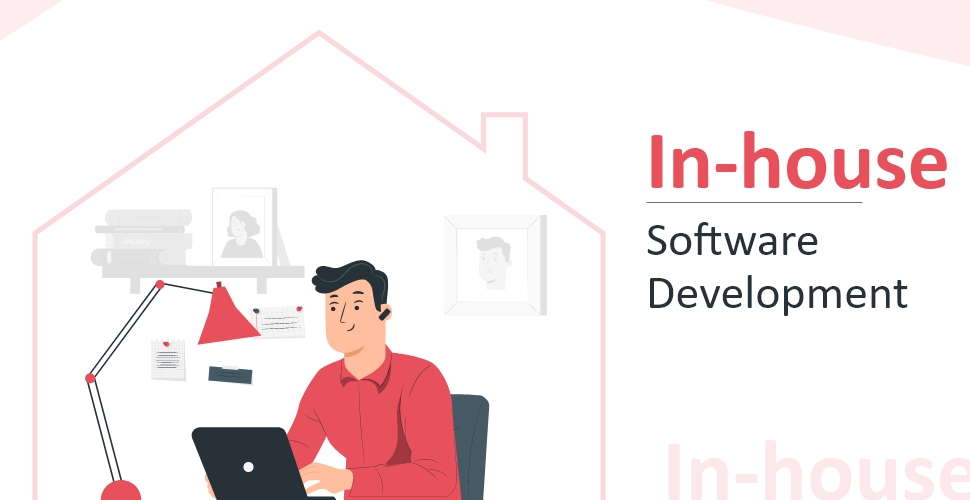Software development has become necessary for almost all business domains. For developing software, entrepreneurs must choose from hiring freelance developers or In-House or Outsourcing Software Development. Hiring freelancers is quite risky that many people overshadow and then get stuck between in-house and outsourcing software development.
Building an in-house team of tech specialists takes significant time and money in terms of maintenance and administrative expenses. It could be the reason for Information Technology Outsourcing Services’ growth. As stated by Statista, the market size of information technology outsourcing amounted to 66.52 billion U.S. dollars in 2019. It clearly indicates more and more companies acquired outsourcing software development to cut corners.
Noteworthy, it is not a bandwagon to jump upon, and you need to look into your project requirements. For long-term cooperation, you can hire a local team of developers. For other imperative aspects of Outsourcing vs. in-house development, let’s check out their pros and cons.

In-house Software Development
Many companies build their own in-house software development team to create and maintain multiple long-term software products. For making an in-house software development team, one needs to recruit a pool of talent. It includes software developers, UI/UX designers, QA engineers, and a technical leader to manage the project and ensure quality coding.
Pros
Culture and Engagement: As the professionals work as a permanent member of the company, they incline to pay more attention to the company’s software needs. If any emergency or problem occurs in the software, an in-house development team can resolve it real-time. Moreover, they get engaged in the company’s culture and environment easily.
Nil Communication Barrier: The entire development team works under the same roof that eliminates communication barriers or chances of misunderstandings. You can call for a team meeting at any time during working hours that streamline communication at everyone’s comfort. Further, direct reporting saves loads of time and expedites the development process.
Seize Agility: The main advantage of in-house software development is that you can customize your project to an eternal extent. You got the steer and can customize any major to minor features and functionalities of the software. The in-house team enables the company to maintain software products independently with assuring faster bug fixing.
Cons
Extremely Expensive: Building an in-house team requires extravagant funding for initial, small, and large-scale projects. It can cost a fortune as you need to pay for office rent, taxes, hardware, software, training, sick days, etc., even on inactivity.
Staff Turnover: In the software industry, there are myriad opportunities available for all software developers that evoke the tendency to change the workplace frequently within developers. Consequently, you may have to invest in recruiting and training new developers every now and then. Recruiting talented developers takes time that affects ongoing projects and may slow down the development process.
Lack of Competence: You may also have to compromise in developers’ competence or adaptability with an in-house developers pool. The reason being, hiring specific technical skilled developers takes a lengthy recruitment process that includes technical and practical tests. Moreover, you need to pay fees to recruitment agencies for hiring. Which means it can exceed the remuneration and maintenance cost of an in-house development team.

Outsourcing Software Development
Outsourcing Software Development is an excellent alternative to in-house software development that probably cuts the cost to half. The way the IT outsourcing market’s turnover is growing says that predominantly companies outsource their software needs. Without paying for infrastructure maintenance or remuneration, you can have advanced software solutions by delegating it to an outsourcing mobile app development company.
Pros
Budget-Friendly Approach: Software Development Outsourcing is a way too cost-effective than in-house development. The approach significantly reduces costs by eliminating recruitment fees, developers’ remuneration, and other expenditures of maintaining full-time developers in-house. On the contrary, you get experienced developers working on your project that raises your software success chances.
Faster Time-to-Market: Hiring developers, proceeding their employment, onboarding, and then setting up the development process inadvertently cause a long time to market your software. In contrast, when you outsource software development, it gets you started developing the software almost from the next day. Such practice accelerates the time to market your software with accurate testing.
Top talent pool: Without spending any extra penny, you get master developers who have developed many software products similar to yours. You can access their unique talent and expertise to create features that matter to your audience, irrespective of the required skills for the same.
Besides, the outsourcing development company allows you to scale up or down the team as per your project changes and business requirements. Having the same kind of flexibility with in-house development is nearly impossible.
Cons
Security risk: While you outsource your software development, you may lack face-to-face communication and control over the entire development process. It might make you feel unprotected and scare you that your ideation or groundwork would be stolen.
However, this fear can be limited by opting for the right and credible partner. Make sure both parties agree on reporting, acknowledgment, and comfortable online meeting schedules. For securing your idea, sign an NDA agreement that guarantees the protection of your project idea and rights.
Communication Gap: Your outsourced software development company can be from another continent or country that may lead to language barriers. Nonetheless, since IT specialists tend to have fluency in English, the language issue has almost diminished.
Another possible communication barrier is a different time zone of your partner company. To overcome this barrier, vendors use a generic and comfortable solution, such as scheduling the meeting in advance or conveying through email and messages.
So, what to choose?
Well, what you should choose among In-House vs. Outsourcing Software Development is highly dependent on your business and project requirements. We have stated a few advantages and drawbacks of both approaches that may help you decide your project’s ideal one. Though, if you have a minimal budget and time, outsourcing the development is for you, which also fulfills the expert developers’ needs. Further, for any query, you can contact us.
